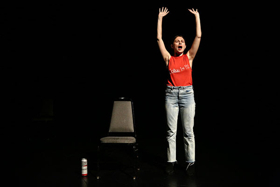The Chocolate Factory Theater Presents MORE PROBLEMS WITH FORM by Lauren Bakst

The Chocolate Factory Theater (www.chocolatefactorytheater.org) continues its Thirteenth Anniversary season with the premiere of More Problems with Form, a new performance by Lauren Bakst. Tickets are $20 and may be purchased in advance at (212) 352-3101 or www.chocolatefactorytheater.org.
In the year preceding this performance, Lauren Bakst has been looking at her life as an object of study. This practice has inevitably transformed her life into a kind of fiction or theater, and it is this theater from which More Problems with Form emerges. Studying her own performances inside of pre-existing forms, in which she has at times played the roles of wife, woman, dancer, audience member, analysand, and many others, More Problems with Form asks: when does performing, in life and on stage, make space for the unwieldy contradictions of living and desiring, and when does it hold things, like bodies, people, and ideologies, in place?
More Problems with Form presents the body of writing that this life-study has yielded in a performance that might be closer to a film-screening. Or is it a film-screening that is more like a performance? The work includes many multiples of Lauren, sometimes played by herself and sometimes by others in a series of videos featuring her fellow group therapy members, her lover, and her mother.
The videos unfold through a three-act structure. In Act One, Group, a monologue for "Laurin" is delivered in one continuous stream by six people claiming to be "Lauren." Each of the actors are seen in their bedrooms, the intimacy of which juxtaposes the scripted nature of the monologue. However as the video continues, the slippage between what is scripted and what is improvised becomes increasingly up for debate.
In Act Two, Relationship, we leave the bedroom for the black-box theater, where actor Jess Barbagallo delivers a monologue opening deliberately with the affirmation, "I am not performing right now, but I am a performer." Act Two continues to deconstruct theatrical presence through the delegation of Lauren's first-person texts to others, and takes the gesture one step further through the hyper-presence of Lauren's movements while holding the camera and her subsequent edits.
In Act Three, Mom, we find ourselves back in the bedroom but this time with Lauren and her mother Mary. Mother and daughter play mother and daughter, as they recreate a scene from Chantal Akerman's 1978 film Les Rendez-vous d'Anna. The protagonist, Anna, is a stand-in for Akerman herself, in this quietly moving self-portrait of the artist. In the final scene of the film, we hear the playback from Anna's answering machine. A disembodied voice asks, "Anna, where are you?" It is this question-"where are you?"-that Lauren, too, has been following.
The audience is ushered through these various on-screen scenarios by Lauren's live presence in the room where she performs the role of an unreliable narrator or self-appointed oracle whose body and voice are constantly in different places and intentionally out-of-sync. Oscillating between the live and the pre-recorded, Lauren moves her voice and her "I" around the room and through others. Her deferrals have accumulated to produce this event.
More Problems with Form indulges in the dissolution and multiplication of the subject, bathes in the alienation that is part and parcel of all intimacy, and gets closer to the difficulty of knowing oneself. Its recursive nature insists on an act of contemplation that takes time.
At the invitation of Wendy's Subway, Lauren Bakst created a limited edition artist book, more problems with form or, desire notes or, still woman, as a part of the process of developing this work. The book was initially published in the fall of 2018 on the occasion of the exhibition "Moving Body, Moving Study" at BAM. Wendy's Subway will be running a reprint of the book and copies will be available for purchase at The Chocolate Factory during the run of More Problems with Form.
More Problems with Form continues following threads of material and performance strategies that were initiated in the contexts of the solo exhibition "Group" at Klaus von Nichtssagend Gallery (2018), through Dance and Process at The Kitchen (2018), and as a part of the exhibition "Moving Body, Moving Study" at BAM, (2018).
Created and performed by Lauren Bakst, with on-screen performances by Tanner Cohen, Peter Vack, Chanterelle Ribes, Joe, Betsey Brown, Jess Barbagallo, and Mary Carmody. Text and videos by Lauren Bakst. Dramaturgy with Jess Barbagallo. Lighting Design by Madeline Best. Video Design by Keith Skretch. Associate Video Design by Katherine Teed-Arthur. Sound & Score by Isabel Barnes & Garrett Crosby. Sound Design by Ian Douglas Moore.
Lauren Bakst is an artist, writer, and dancer living in New York. Her performance, video, and publication works have been commissioned by The Chocolate Factory Theater (2019), BAM/Wendy's Subway (2018), Dance and Process at The Kitchen (2018), Klaus von Nichtssagend Gallery (2018), SculptureCenter (2017), Danspace Project (2016) and Pioneer Works (2015). She is a Contributing Editor to the Movement Research Performance Journal where she worked as Managing Editor from 2015-18. She has held residencies and fellowships at The Drawing Center, The New Museum, and danceweb at ImpulsTanz, among others. Lauren teaches in Philadelphia at The University of the Arts School of Dance, where she is currently curating The School for Temporary Liveness, a project that has been supported by the Pew Center for Arts & Heritage and will take place in the fall of 2019.

Videos

